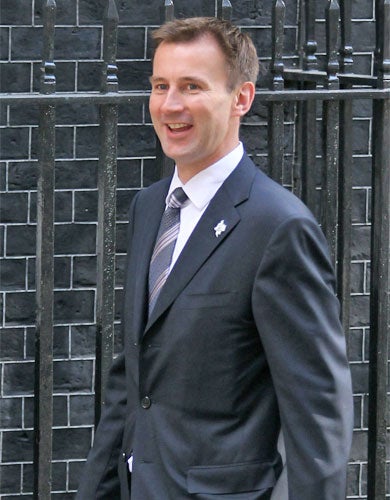Local TV and faster broadband plan unveiled

The broadcasting industry will be transformed so that cities across Britain have their own television stations, run by companies that are freed from the rules that currently restrict cross-media ownership, the Culture Secretary promised yesterday.
In his first major speech since his appointment, Jeremy Hunt pledged to spend up to £300m to give Britain "the best superfast broadband in Europe" by the end of this Parliament, admitting that the UK was lagging behind on internet speeds.
The promises will not be easy to deliver. One of Mr Hunt's first tasks in his new job was to start finding £66m of budget cuts. Yesterday, he was anxious to stress that "my starting point is a positive and not a negative one".
He focused on local media, diverting funding that his Labour predecessors had wanted to put into protecting regional ITV news into pilot schemes for broadband of up to 100 megabits per second to reach rural areas.
His vision of the future was laced with criticisms of Labour's "missed opportunities". Britain had allowed rival countries to "march ahead and steal our lunch", Mr Hunt claimed, saying: "We are now ranked 33rd in the world when it comes to broadband speed, with an average that is nearly five times slower than South Korea's."
The minister expressed horror that the world's largest advertising group, WPP, had quit Britain for Ireland and that many famous British media companies had been brought "to their knees" by recession and technological change.
He said he regretted that one of the only city-wide television networks – Manchester's Channel M – had suffered drastic cuts under the ownership of the Guardian Media Group. "We are in danger of allowing ourselves to be once again defined by the old truism that we provide the creativity and the rest of the world makes the money," he said.
Mr Hunt's proposals for a local TV revolution signalled an end to Labour's idea to replace regional ITV news with services provided by independently-funded news consortia (IFNCs). These were a "misguided idea" that encouraged "subsidy junkies", he said.
He suggested Britain could look to America to see how local TV could flourish, saying: "Birmingham Alabama has eight local TV stations, despite being a quarter of the size of our Birmingham that... doesn't even have one."
The minister had previously cited Liverpool, where the Liverpool Echo newspaper is owned by one of the UK's largest regional media groups, Trinity Mirror, as an example of a city that might benefit from a relaxation of cross-media ownership regulations.
But Trinity Mirror's chief executive, Sly Bailey, said she preferred the IFNC model, adding: "We believed the IFNCs' capacity to tap the talent and expertise of regional media companies to provide a viable alternative to the BBC's local news made sense for everyone."
Subscribe to Independent Premium to bookmark this article
Want to bookmark your favourite articles and stories to read or reference later? Start your Independent Premium subscription today.

Join our commenting forum
Join thought-provoking conversations, follow other Independent readers and see their replies